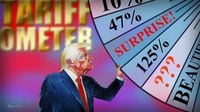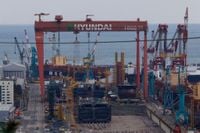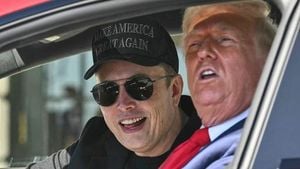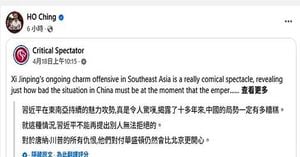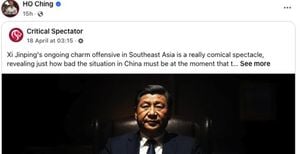As finance ministers and central bankers convene in Washington this week for the Spring Meetings of the IMF and World Bank, the spotlight is not just on the high-profile leaders but also on the often-overlooked trade negotiators. Among them, South Korea is making headlines, seeking to ease the punitive tariffs imposed by the Trump administration. U.S. Secretary of Treasury Scott Bessent and Trade Representative Jamieson Greer are scheduled to meet on Thursday, April 24, 2025, with South Korea's Finance Minister Choi Sang-mok and Industry Minister Ahn Duk-geun.
This high-stakes dialogue comes amid a backdrop of rising tensions as President Trump threatens a trade war that could have far-reaching implications for the global economy. The specter of tariffs and executive orders looms large, leading to increased anxiety among exporters and policymakers alike.
For Vietnam, the situation is particularly precarious. President Trump imposed a staggering 46% mutual tariff on the country, a decision that has been temporarily suspended for 90 days. However, exporters in Vietnam are understandably nervous, pushing their factories to operate at full capacity to maximize shipments to the United States before the grace period expires.
Meanwhile, Lesotho, a small African nation, is also feeling the pinch. The country, which exports diamonds and jeans to the U.S., faces an equally daunting 50% mutual tariff. Despite contributing positively to the U.S. trade balance, Lesotho finds itself caught in the crossfire of a tariff war that many argue is misguided.
The trade tensions appear to be part of a broader strategy by the Trump administration to counter China's growing influence in the region. As Trump raises tariffs, Chinese President Xi Jinping is actively working to strengthen ties with Southeast Asian nations, many of which are disillusioned by U.S. trade policies. Recently, Xi completed a three-nation tour of Southeast Asia, signaling a shift in alliances as countries seek to reduce their dependence on the U.S. market.
In a striking demonstration of technological prowess, China hosted the Humanoid Robot Marathon on April 19, 2025. The event showcased Tiangong Ultra's humanoid robot, which completed a 21km course, highlighting China's advancements in artificial intelligence and robotics. These developments underscore a growing concern that the U.S. may be inadvertently fueling China's technological innovation through its aggressive tariff policies.
Thomas Friedman, a columnist for the New York Times, recently visited Huawei's state-of-the-art R&D campus in Shanghai. During his tour, he observed the massive facility housing 35,000 research personnel and over 100 buildings, complete with monorails and cafes. Friedman noted a shift in perspective, suggesting that the future of innovation may no longer lie in the United States but in China. "In the past, I went to the U.S. to confirm the future, but now I advise looking at China," he remarked, reflecting a growing sentiment among analysts.
As the U.S.-China tariff war escalates, experts warn of the potential fallout for both nations. The ongoing conflict could result in higher prices for U.S. consumers, leading to widespread discontent. Investors are also on edge, with many who once supported Trump's policies expressing regret. One Wall Street figure lamented, "We misjudged him," highlighting the unpredictable nature of U.S. politics under the MAGA (Make America Great Again) banner.
The complexities of the tariff war reveal a game of chicken that risks hurting both countries. While Trump aims to check China's rise, the reality is that his policies may be opening doors for increased Chinese self-sufficiency and innovation. As tariffs rise, the U.S. may find itself at a strategic disadvantage, with consumers and investors bearing the brunt of the consequences.
In conclusion, as global leaders gather in Washington, the discussions surrounding tariffs and trade agreements are more critical than ever. The outcomes of these negotiations could reshape not only the U.S. economy but also the dynamics of international trade as countries navigate the challenges posed by aggressive tariff policies. With the stakes so high, the world will be watching closely to see how these events unfold.
